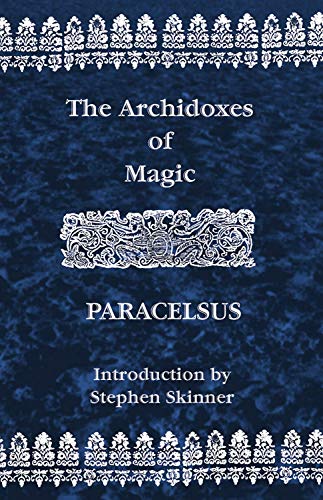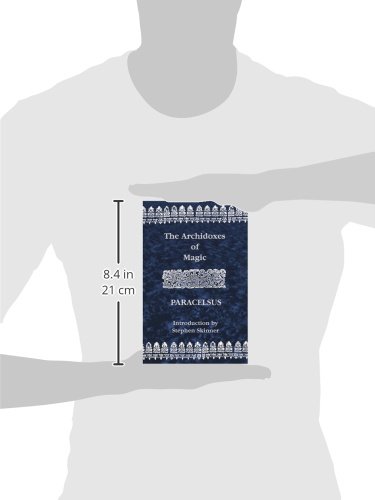


Archidoxes of Magic
W**A
Ahhh....The Alchemist!
This book is such a great addition to my library. The text is preserved as when written, easily transporting the reader off into the time of Paracelsus. I highly recommend this book. (The other weird looking "f" letters are "s" letters fyi)
F**K
Don't waste your money
Very disappointed. ...the reprint is awful, hard to read.I would have never bought this book if I had picked it up in a store. I'm a fan of Franz Hartman and he referenced the author. Don't bye it. Overpriced and poor quality.
S**N
Very nice
Great price fast shipping looks interesting. 😊
L**N
The Archidoxes of Magic
This is the classic Renaissance manual on magic. Paracelsus falls midway between Marsilio Ficino and Athanasius Kircher in the exploration of hermetic systems as keys to understanding the inner workings of creation. This particular edition reproduces the actual pages of an early English translation, which makes it slightly harder to read but lends it great charm. The soft cover has a smooth, waxy feel.
J**T
Five Stars
Great
T**T
A Renaissance Composition of Three Esoteric Books in One
This review is of the Ibis Press edition, with an introduction by Stephen Skinner. The Archidoxes of Magic is actually three books in one. The first book, Of the Secrets of Alchemy, is comprised of three treatises, each with seven to nine chapters. The second book, Of Occult Philosophy, is comprised of eleven chapters. The third book, Of Celestial Medicines Containing the Mysteries of the Signs of the Zodiac, is comprised of two treatises, the first being seventeen chapters in length with an appendix, and the second listing the twelve signs of the Zodiac with their seals, among other things. The table of contents (called "The Contents of this Book") at the beginning of the Archidoxes does not distinguish the three books, but acts more like an index of topics throughout the books. The format of the Archidoxes as well as the Old English translation will require patience from the reader, and one will wish for a modernization of the text. One may also notice in the Ibis Press edition (if one reads carefully) that the last two pages of the prologue after the table of contents are reversed so that the fourth page follows the second, and the third page follows the fourth. I can't tell if this was an error in the original text that was carried over in the facsimile reprint or whether the error occurred with Ibis. Either way, keep this in mind when reading it.Skinner gives a nice, concise introduction to the text and notes that "it is difficult to ascertain with any degree of certainty which writings are genuinely by Paracelsus and which are spurious, as most of his writings were dictated to his pupils, and few of his works were actually printed during his lifetime." He goes on to say: "After his death, his disciples were apparently very careless in their preparation of his manuscripts for the printers, and many errors have crept into the printed versions of his writings." This is important to keep in mind. Skinner doesn't expressly say that any of the texts that comprise the Archidoxes are spurious. However, when one reads the entries in the Dictionary of Gnosis and Western Esotericism on magic and Paracelsus, the implication is given by their authors that some or all are spurious. Regardless of one's position on this, the Archidoxes speaks for itself and has its supporters.The Archidoxes is an interesting composition and one cannot miss the author's Christian viewpoint, especially when he attacks the "negromancers", "sorcerers" and "witches" for abusing or corrupting the art of magic (cf. Of Occult Philosophy). His Christian position is also made clear in the following quote (using modern spelling): "Magic is therefore a most necessary and pure Art; not defined nor corrupted with any Ceremonies or Conjurations, as Nigromancy: For in Magic there is no use of Ceremonies, Consecrations, Conjurations, Blessings or Curses; but of faith alone whereof Christ speaks, saying, that by it we shall be able to remove Mountains and cast them into the Sea; and to compel, loose, and bind all Spirits: This is the true foundation and Instrument of Magic" (ibid., page 82). Some contemporary students of magic may take exception to some of the author's beliefs, but will still recognize the importance of faith for magical practice and will want to have a copy of the text in their personal library for reference.
G**C
A Symphony of Occult Topics!
Leaves you blitzed and bemused by the stupefying collection of topics. Just when you thought you knew a good chunk of this stuff, along comes a book like this and it proves you still have a universe within a universe to learn. A great read.
Trustpilot
2 months ago
1 month ago